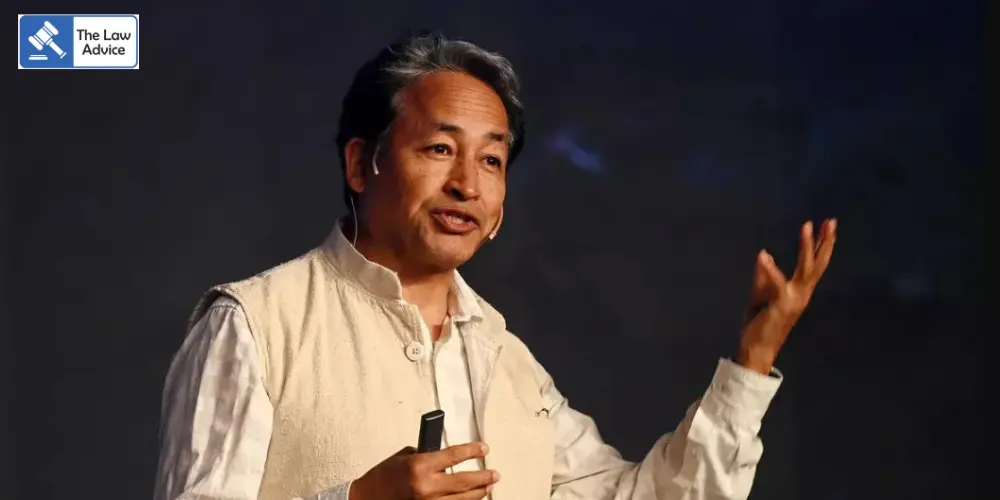
The Supreme Court of India on October 6, 2025, issued a notice to the Central Government in a writ petition filed by Gitanjali J. Angmo, the wife of renowned Ladakh-based social activist and education reformer Sonam Wangchuk, challenging his preventive detention under the National Security Act, 1980 (NSA). The detention reportedly followed the recent violent clashes in Ladakh.
A Bench comprising Justice Aravind Kumar and Justice N.V. Anjaria heard the matter and directed that it be listed for further hearing on October 14. The petition, filed under Article 32 of the Constitution, is a habeas corpus petition seeking the immediate release of Wangchuk, who is reportedly lodged in a jail in Jodhpur.
In the writ petition, Angmo has challenged the detention as illegal and unconstitutional under Article 22, contending that no grounds of arrest were furnished either to Wangchuk or to her. She asserted that the denial of grounds of detention violates the procedural safeguards guaranteed under the Constitution.
Appearing for the petitioner, Senior Advocate Kapil Sibal argued that the grounds of detention must be served upon the petitioner, especially as she is filing the habeas corpus plea on behalf of her husband. “Without knowing the grounds of detention, the detention order cannot be effectively challenged,” Sibal submitted.
On the other hand, Solicitor General of India Tushar Mehta, representing the Union Government, informed the Court that the grounds of detention have already been served on the detenu, Sonam Wangchuk, and there is no legal requirement to provide them to his wife. “The law does not mandate that the grounds of detention be supplied to the spouse of the detenu,” the SG stated.
When Sibal pressed for an interim direction for supply of the detention grounds to the petitioner, Justice Aravind Kumar remarked, “At this stage, we will not say anything.” However, turning to the Solicitor General, the Bench asked what the impediment was in furnishing a copy of the grounds to the petitioner. The SG reiterated that no statutory obligation exists to share the document with the wife.
Sibal clarified that his request was not to create a separate ground for challenging the detention, but rather to enable an effective challenge to the legality of the detention itself. The Solicitor General stated that he would examine the feasibility of providing the grounds of detention to the petitioner before the next hearing.
During the hearing, Sibal also sought interim relief in the form of medical assistance for Wangchuk. Responding to this, SG Mehta said that during his medical examination, the detenu had declared that he was not on any medication, but assured that if any medical requirements arise, they would be duly addressed by the authorities.
Sibal further requested that the petitioner be allowed to meet her husband. To this, Justice Kumar inquired whether any formal request for a meeting had been made to the authorities. On learning that no such application had been filed, Justice Kumar declined to issue directions at this stage. “First make a request, and if it is rejected, then approach the Court,” the Judge said.
Responding sharply to Sibal’s submissions, the Solicitor General accused the petitioner of attempting to create unnecessary public sentiment around the issue. “This is all an attempt to create hype and an emotive issue in the media—that the detenu is denied medicines and meetings with his wife. It’s only to portray before the region and public that he is being deprived. That’s all,” the SG remarked.
Justice Kumar also questioned Sibal as to why the petitioner had not approached the High Court before coming directly to the Supreme Court. Sibal replied that since the detention order was passed by the Central Government, it was unclear which High Court had territorial jurisdiction in the matter. Justice Kumar responded, “You tell us. Answer this question also next date,” indicating that the Bench would consider that procedural aspect during the next hearing.
The case has drawn national attention as it concerns the preventive detention of Sonam Wangchuk, a well-known environmentalist, innovator, and education reformer from Ladakh, under a stringent national security law. The outcome of this case may have broader implications on the scope of habeas corpus petitions and the interpretation of procedural rights under preventive detention laws in India.
Case Title: Gitanjali J. Angmo v. Union of India & Others
Case No.: W.P. (Crl.) No. 399 of 2025
Next Hearing Date: October 14, 2025
Website designed, developed and maintained by webexy